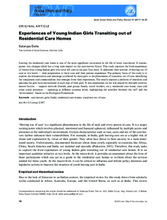childrens_living_arrangement
children_living_without_bio
Displaying 281 - 290 of 393
Extracting on chronologic data, this book discusses the politics and practice of intercountry adoption starting with the state international adoption to in the 1950s continuing to present-day adoption practice and protections.
Indian government finds that increased wait for adoption related to rise in human trafficking.
In the wake of a child smuggling racket being unearthed in the state, the West Bengal government on Monday announced setting up a panel for prevention of child trafficking.
This booklet on aftercare is part of a Series on Alternative Care covering the latest legal and policy framework on Alternative Care in India, which has been presented in an easy-to-understand style so that they can be used as an effective reference material by all stakeholders.
This booklet covers the latest legal and policy framework on Foster Care in India, which has been presented in an easy-to-understand style so that it can be used as an effective reference material by all stakeholders.
In 2014, Leher partnered with Sarvo Prayas Sansthan (SPS) to develop and implement a community based preventive child protection initiative in the district of Madhubani in Bihar, India. This report presents the learning from that initiative.
This study captures the lived experiences of twenty-four young Indian girls who have left care in the past four years. It addresses their journey of moving out of care at two levels — their preparation to leave care and their present experience.
This is an article from the Free Press Journal stating that the Bombay High Court directed the Maharashtra government to carry out a census of street children so that they can be provided with basic facilities.
This article aims to assess the relevance of Western youth development models to adolescents in institutional care in India. The authors review three frameworks for positive youth development.
This study examines the link between Rejection Sensitivity (RS), Attachment Pattern (AP) and Socio-Emotional Adjustment (SA & EA) among adolescent's living in orphanages and those living with their parents. Adolescents (N=360) ranging between 14–18 years completed self-report measures. The findings suggest that there exists significantly positive and negative correlation as well as significant interaction between gender and living conditions among the variables RS, AP, SA and EA.





